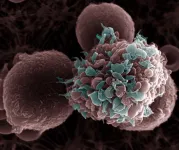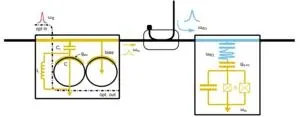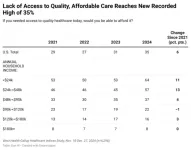(Press-News.org) CNIO researchers discover that, in mice that eat a lot of fat, cancer cells travelling through the blood surround themselves with platelets, which act as an armor-like protection as they spread.
In addition, in animals with a fatty diet it is easier for tumor cells to 'nest' in other organs and give rise to metastasis of the primary tumor.
“These results anticipate a future in which dietary changes, together with the control of platelet activity, will complement antitumor treatments,” says Héctor Peinado, of the Spanish National Cancer Research Center (CNIO).
The study is published in Nature Communications.
Obesity is associated with an increased risk of developing breast cancer, and a greater probability for the cancer to spread to other organs – metastasize –. But the causes of this association are still not well understood. Researchers at the Spanish National Cancer Research Center (CNIO) have now provided new data by discovering that a high-fat diet activates mechanisms that facilitate metastasis.
This is a study led by Héctor Peinado, head of the CNIO's Microenvironment and Metastasis Group, conducted in animal models of triple-negative breast cancer that develop lung metastasis. It is published today in Nature Communications.
For cancer to spread to other organs, many tumor cells must leave the primary tumor, travel through the bloodstream, nest and proliferate in another organ. Sometimes the primary tumor sends molecules that modify the target organ in advance, and prepare the equivalent of a nest that hosts the tumor cells: this is the so-called 'premetastatic niche', in which the tumor cell can take root and develop metastases.
The CNIO group shows in their new study that mice which are obese from eating too much fat experience changes that favor the creation of the premetastatic niche, in this case in the lungs. Specifically, platelet activation and blood clotting capacity are increased; in addition, fibronectin, the protein that connects lung tissue cells, is activated.
A platelet armor
It is an established fact that obesity promotes blood clotting, a process that depends on blood cells called platelets. Indeed, as CNIO researcher and first author of the study Marta Hergueta observed, in animals fed with high fat, the cells that are shed from the primary tumor are surrounded, during their journey through the blood, by more platelets than in mice with a normal diet.
One hypothesis is that the platelets could be making it difficult for the body's defenses to detect the cancer cells: the platelets would form “an armor around the tumor cells, preventing the immune system from recognizing and eliminating them,” explains Peinado.
Fertile breeding ground for metastasis
In addition to affecting platelets, the CNIO group found that the high-fat diet increases the expression of the protein fibronectin in the lung tissue where tumor cells metastasize.
Fibronectin builds the tissue that connects lung cells, thus facilitating the creation of the premetastatic niche that hosts the tumor cell. It also enables the tumor cell to interact more efficiently with platelets. “We have seen that the interaction of the tumor cell with both the lung endothelium and the platelet is regulated by fibronectin,” says Peinado.
Studies in patients
To study the implications of these results for human patients, the CNIO’s Breast Cancer Clinical Research Unit, directed by Miguel Ángel Quintela, participated in the study.
After analysing blood samples from triple-negative breast cancer patients, obtained before surgery and after undergoing chemotherapy, it could not be verified that obesity posed an additional risk for the generation of metastases. However, patients with increased blood coagulation – with a shorter prothrombin time – were found to have a higher risk of relapse at five years.
These findings “could help identify additional risk factors in breast cancer patients undergoing treatment, thus contributing to a better clinical management of the disease,” says Peinado.
Potential clinical application
The work, carried out in collaboration with other CNIO units and other centres in Spain and Canada, has explored initial avenues for clinical application of the results. One of them was to modify the diet in animal models. When the high-fat diet was withdrawn, and the mice lost weight, platelet and coagulation behavior returned to normal levels. As a result, metastases were reduced.
“I think these results, coupled with clinical studies from other groups, present a future where dietary intervention or dietary changes, along with control of platelet activity, may increase the efficiency of certain antitumor treatments,” Peinado says. “They are not going to be treatments by themselves, but they can complement them.”
Funding
This study has been financed mainly by the British NGO Worldwide Cancer Research, in addition to state funds from the Ministry of Science and Innovation, the State Research Agency and the Carlos III Health Institute, as well as European ERDF funds and by private grants from the 'la Caixa' Foundation and the Spanish Association Against Cancer (AECC).
END
Applied physicists at the Harvard John A. Paulson School of Engineering and Applied Sciences (SEAS) have created a photon router that could plug into quantum networks to create robust optical interfaces for noise-sensitive microwave quantum computers.
The breakthrough is a crucial step toward someday realizing modular, distributed quantum computing networks that leverage existing telecommunications infrastructure. Comprising millions of miles of optical fiber, today’s fiber-optic networks send information between computing clusters as pulses ...
NEW YORK, NY (April 2, 2025)--
April 2, 2025—An AI tool that analyzes nurses’ data and notes detected when patients in the hospital were deteriorating nearly two days earlier than traditional methods and reduced the risk of death by over 35%, found a year-long clinical trial of more than 60,000 patients led by researchers at Columbia University.
The new AI tool, CONCERN Early Warning System, uses machine learning to analyze nursing documentation patterns to predict when a hospitalized patient is deteriorating before the change is reflected in vital signs, allowing for timely, life-saving ...
An AI model trained on large amounts of genetic data can predict whether bacteria will become antibiotic-resistant. The new study shows that antibiotic resistance is more easily transmitted between genetically similar bacteria and mainly occurs in wastewater treatment plants and inside the human body.
"By understanding how resistance in bacteria arises, we can better combat its spread. This is crucial to protect public health and the healthcare system's ability to treat infections," says Erik Kristiansson, Professor at the Department of Mathematical Sciences at Chalmers University of Technology and the University of Gothenburg in Sweden.
Antibiotic ...
EMBARGOED UNTIL 09:00 BST WEDNESDAY 2 APRIL
Tinker Tots: A Citizen Science Project to Explore Ethical Dilemmas in Embryo Selection
Researchers at the University of Oxford, University of Exeter, and the National University of Singapore Yong Loo Lin School of Medicine present a new, interactive study.
Oxford, 2 April 2025: When choosing an embryo for implantation during in vitro fertilization (IVF), would you consider its chances of developing a health condition? What about traits like creativity, intelligence, ...
Beekeepers in the United States lost more than 55 percent of managed colonies last year—the highest loss rate since the Apiary Inspectors of America began determining them in 2011. A new study from University of Vermont scientists and international collaborators supports a novel method for testing hygienic behavior in honey bees that could promote breeding more disease resistant colonies in the future.
“Beekeepers are losing bees at a rate that they say is unsustainable,” says Samantha Alger, director of the Vermont Bee Lab at the UVM and lead author of the study. “In the ‘80s, beekeepers lost colonies ...
Building multifamily housing in California is more than twice as expensive as it is in Texas, with much of the difference driven by state and local policies that contribute to long permitting and construction timelines, and higher local development fees, according to a new RAND report based on cost information from more than 100 completed apartment projects.
The high cost of housing and its associated effect on homelessness is a defining policy issue in California.
The cost of building multifamily housing is 2.3 times higher in California than Texas and 1.5 times higher than in Colorado, ...
PISCATAWAY, NJ – A prevention program that teaches college students about the links between risky drinking and sexual assault—and how to protect themselves and their friends—has shown early promise, according to a new report in the Journal of Studies on Alcohol and Drugs.
It’s well known that alcohol and sex can sometimes be a dangerous mix for young adults. Alcohol intoxication raises the odds of having unprotected sex and, possibly, contracting a sexually transmitted disease or having an unplanned pregnancy. Drinking can also increase the risk of falling victim to sexual assault or becoming the perpetrator.
Yet college prevention programs have traditionally ...
WASHINGTON, D.C. – April 2, 2025 – The inability to pay for healthcare in the U.S. has reached a new high, with more than one-third of Americans (35%), or an estimated 91 million people, reporting that they could not access quality healthcare if they needed it today, according to the latest West Health-Gallup Healthcare Affordability Index. The Index has been tracking healthcare affordability and access in the U.S. since 2021.
Rates were higher among Black and Hispanic Americans, with 46% and 52%, respectively, reporting ...
Scientists should experiment with creative ways of communicating their work to inspire action to protect the natural world, researchers say.
Scientists primarily publish their work in academic journals, where writing is expected to be technical, objective and dispassionate – making it unlikely to appeal to, or be easily understood by non-experts.
The researchers – from the University of Exeter – argue for science “translated into stories”, with benefits both for science and wider society.
They suggest ways that scientists can tell powerful, passionate stories without compromising the objectivity of science.
“As ...
Vision is one of the most crucial human senses, yet over 300 million people worldwide are at risk of vision loss due to various retinal diseases. While recent advancements in retinal disease treatments have successfully slowed disease progression, no effective therapy has been developed to restore already lost vision—until now. KAIST researchers have successfully developed a novel drug to restore vision.
< Photo 1. (From left) Ph.D. candidate Museong Kim, Professor ...







